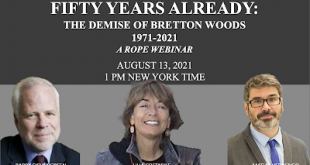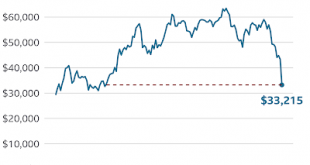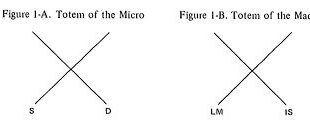ROPE will be hosting a special Zoom Webinar, hosted by Lilia Costabile. The webinar is on August 13, 2021, at 1 pm, NY time (Bretton Wood collapsed on August 15, 1971) . To register, please use the following link.
Read More »Impact factor
The Review of Keynesian Economics (ROKE) Clarivate impact factor has gone up again. The five year one is a bit higher at 1.397. For a critical discussion of the role of impact factors and journal rankings see this old post from when ROKE was just 3 years old and was ranked for the first time. Next year it will be the 10th anniversary of the journal.
Read More »Bitcoins and El Salvador
I haven't written about bitcoin in a long while, in part because it is somewhat irrelevant, like all notions of a future dominance of private currencies (another of Hayek's incredible blunders; more problems with Hayek here and here). Note that nation states are fine and well, and not going anywhere, and hence national currencies will remain dominant. Only a weak state without its own currency (El Salvador is dollarized; on that see here and here) would make bitcoins legal tender. But more...
Read More »From developmental to failed state
[embedded content]The talk I gave for Rethinking Economics Peru (in Spanish). Go check their website and materials here or if you don't speak Spanish there's a lot of interesting material in the general (in many languages) Rethinking Economics here. An older post, in English, that discusses essentially the same thing.
Read More »The end of Friedmanomics?
Friedman's adviseesZachary Carter, of Price of Peace fame (a good book that I recommend, btw), wrote an interesting piece on Milton Friedman's legacy, which I think is, as Hyman Minsky said of Joan Robinson's work, wrong in incisive ways. But even before we get to his main point, that the era of Friedmanomics is gone, it is worth thinking a bit about the way he approaches the history of ideas. This is clearly a moral tale for Carter, with good guys and bad guys. Gunfight at high noon. It is...
Read More »Was Keynes a Liberal or a Socialist?
[embedded content]A shorter version at the ISET conference of my Will Lyons Lecture at Franklin & Marshall. And yes, I think Harrod and Skidelsky were right (not Crotty and O'Donnell). He was definitely an Asquith Liberal.
Read More »Prebisch After ECLAC and UNCTAD
[embedded content]My talk at the Universidad Nacional de Colombia last Friday, in Spanish of course. Part of the argument is that Prebisch, contrary to what is often assumed, moved from an argument that emphasized the role of the external constraint in leading to underdevelopment during his United Nations years, to one that put the emphasis on the patterns of domestic consumption, and its negative impact on the surplus, following the literature on stagnation, in his last book on peripheral...
Read More »Gatekeepers and herd behavior: On Tooze and the radicalization of Krugman
"But that one is holding the poop!"Adam Tooze, the author of the monumental Crashed (who was, incidentally, student of Wynne Godley, one of my mentors), wrote a piece for the London Review of Books that has received a lot of praise. While it reviews Paul Krugman's latest book, it provides an overview of the radicalization of New Keynesians, or at least some, that dominate both in academia, and in the corridors or power. The gatekeepers of knowledge and academic and intellectual influence,...
Read More »Life among the Econ: fifty years on
By Thomas Palley (Guest blogger)Almost fifty years ago, the Swedish econographer Axel Leijonhufvud (1973) wrote a seminal study on the Econ tribe titled “Life among the Econ”. This study revisits the Econ and reports on their current state. Life has gotten more complicated since those bygone days. The cult of math modl-ing has spread far and wide, so that even lay Econs practice it. Fifty years ago the Econ used to say “Modl-ing is everything”. Now they say “Modl-ing is the only thing”. The...
Read More »PKES webinars: Post-Keynesian economics and developing countries
22 Apr 2021 None –27 May 2021 NoneThe Global Financial Crisis of 2008 and the COVID pandemic that erupted in 2020 have reinforced criticisms of the main, orthodox current economic theory. At the same time, they highlighted the need for and importance of alternative approaches such as Post-Keynesian Economics (PKE). The Post-Keynesian Economics Society (PKES) is an initiative that fosters research and dissemination within the framework of PKE. Furthermore, PKES is committed to working towards...
Read More » Naked Keynesianism
Naked Keynesianism






